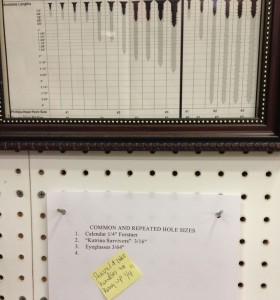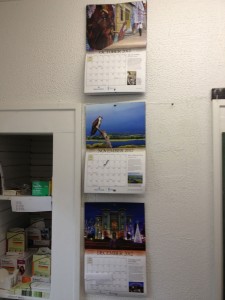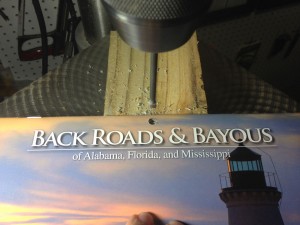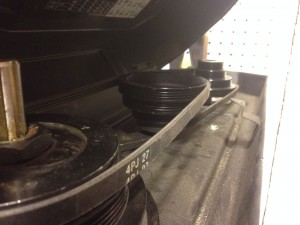Welcome to “Tips From Sticks-In-The-Mud Woodshop.” I am a hobbyist, not a professional, someone who loves woodworking, just like you do. I have found some better ways to accomplish tasks in the workshop and look forward to sharing those with you each month, as well as hearing your problem-solving ideas.
Near my drill press I keep a list of repetitively-drilled holes and their sizes:

It’s a natural location for drill hole sizes, right next to the drill press. No one’s memory is going to recall hole sizes drilled only once each year.
For example, a certain piece of work that my artist wife makes called “Katrina Survivors,” requires a series of holes along its length that are 3/16″. Rather than try to remember that size, or rediscover it by time-consuming trial and error, I keep it on the list, along with 1/4 Forstner” for the holes I drill in calendars every December so that they fit over the screw heads I install them onto. And 3/64″ for suturing lanyards to my glasses.
Post-It-Notes are nearby to make temporary additions to the list until there are enough changes to reprint.
This year I had something of an epiphany when the time came to drill my calendars.

Sure, you can buy Three-Months-At-A-Glance calendars, but I have a natural aversion to “buy.” Our regional bank produces these calendars with professional photography and great stories and, best of all (wait for it!) they’re free!
It occurred to me that a Forstner Bit might be a better paper-hole-puncher than a twist drill. Think about it: Forstner bits come from the factory really sharp and the flat cutting surface cuts the entire circumference at once, instead of the paring/coring action of a twist drill. To try out the theory I got a wide, flat board to hold the calendar flat and simultaneously act as the backer-board.

Good support, a sharp Forstner bit and a firm backer-board is the formula for a nice-looking hole in multiple layers of paper.
When the Forstner bit pops through the last of the paper, the hole is nice and clean.

Feel the need for speed. You want that Forstner bit flying when cutting paper. A slow-moving bit won’t make a clean cut. Here, I have chosen a pulley combination for the fastest spindle speed.
Why not use a hole punch, you ask? Granted, the hole is already the right size, but cutting more than two or three pages at a time puts a real strain on a hole punch. Three pages divided by twelve months is 4 punchings per calendar and I do 7 calendars each year…
And another bonus for drilled holes? They are guaranteed to line up perfectly!
—
Jim Randolph is a veterinarian in Long Beach, Mississippi. His earlier careers as lawn mower, dairy farmer, automobile mechanic, microwave communications electronics instructor and journeyman carpenter all influence his approach to woodworking. His favorite projects are furniture built for his wife, Brenda, and for their children and grandchildren. His and Brenda’s home, nicknamed Sticks-In-The-Mud, is built on pilings (sticks) near the wetlands (mud) on a bayou off Jourdan River. His shop is in the lower level of their home. Questions and comments on woodworking may be written below in the comments section. Questions about pet care should be directed to his blog on pet care, www.MyPetsDoctor.com. We regret that, because of high volume, not all inquiries can be answered personally.


Great! – much appreciate your woodworking tips & regularly learn from them!
Good luck with your full-time vet practice running in the mean time.
Stan
Retired Veterinarian (since 2005) Freelancer, Toy-maker, Hobbyist.
Aranos, South-Eastern Namibia
Thanks, Stan! Great to hear from Namibia! It’s not every day we get a comment from there. I am glad to know you are enjoying your retirement and productive in toy-making. Thanks so much for writing, Jim.